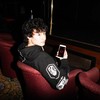
Advertisement

Well, there are people who see certain races as status symbols, and someone had to comment on that.Is this a similar tone to what you were doing with "White Power Milk"?
Yeah. With "White Power Milk," I just wanted to talk about how people see white women as a status symbol. With "Trophy Scarves," I wanted to find another way to come at that. I guess it's the same kind of satirical, tongue-in-cheek approach that I like to take with things. I like to talk about something serious but do it in a lighter, kind of a goofy way.
Advertisement
I don't know. It may be a character, or maybe I think white women are just better! [Laughs] And I think it would be good to make an example of myself. Either way, who cares? I'm not sure it matters.How long have you been into art?
In college, I just started bumming around the art studios on campus. I was hanging around the artists, looking at their work in the studios, and thinking, I could do this if I wanted to. It was more conceptual art, weirdos, minimalists… My first show was with some friends in 1999, in my early 20s.What were you like in high school?
Well, my freshman year of high school, I didn't really have my own identity. I was into hip-hop. So I tried to dress like I was that cool hip-hop guy, but kids could tell that I wasn't real. Everything was too new. There was really no personality. They could tell that I was a fake. Then I got mugged—people always tell me to tell my mugging story in interviews—this kid grabbed my chain, and he just punched me in the face. I tried to catch him but he was too fast… He was the quarterback for the junior varsity football team.So anyways, I got beat up. I ended up going to a school for kids who couldn't fit in anywhere, there was a class of like 20 kids. There, I just became more introverted, and got into music, and spent time in my room listening to jazz records. I became a very private kid. I felt like I didn't fit in anywhere.
Advertisement
I dropped a few hints. I was always a weird kid. Even with the jazz records, it was always the weirdest shit, the experimental stuff. I always wanted to see how far I could go. Oh, so this is John Coltrane? OK, well here's Albert Ayler, or some other random weird shit I could find like, European noise jazz, or Peter Brötzmann. I was always just a fringe person.You work in a medical lab, raising fruit flies to be used in scientific experiments. Do people at work know that you're an artist?
Some of them do.How do they respond to that?
I don't talk about it much with them. They might see me doing the art, begging thing on the trains. Like one time, I was with my wife, and we were going to a party downtown, and I told her, "I'm going to start in the front of the train and I'll meet you in the back of the train." I get up, and right before I'm about to speak I see one of my co-workers, but they didn't see me yet. It made me realize that maybe someone's seen me begging on the train, and thought I was weird.

That's another thing I've had to just let go of: Worrying that she's not into it, or happy with it. I just have to remember that it's not her art. It's not her life. She has her own stuff going on, her own job, her own hobbies… But how does she feel about it? She tolerates it. [Laughs]
Advertisement
Sometimes. But I don't have any expectations. We used to battle about it, like why she liked them, why didn't she like them, that she should like them, and so on… I blocked her on Twitter, so she can't see what I'm doing. She just followed me on Instagram, so I'm probably going to block her on there too.How do you feel about academic analysis of your work? Like when art critics say something like, "this means that" about you? Is that stuff that you, as an artist, think about?
That's a good question I see what you're saying. I'll think, Yeah, OK, that sounds good. But no, I don't think about that, academically or theoretically, really.What's the future of "Trophy Scarves"?
I'm just going to do this as hard as I can for a couple of months, until the next year, and see what happens. I don't know how many is enough. I think maybe like 100 trophy scarves. And then after 100, maybe go to 200. It's like my friend said: "There's never going to be enough trophy scarves. There's always going to be one more trophy scarf."@zach_two_timesMore art from VICE:This Guy Is Losing His Virginity in Public for an Art ProjectThe Enduring Art of AfghanistanThe Art of Taboo - Ren Hang
